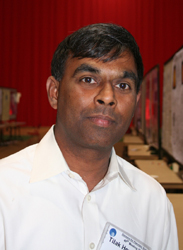EPOXI
Two intriguing investigations -- One flight-proven spacecraft
Tilak Hewagama
Tilak Hewagama
EPOCh Co-Investigator, Goddard Space Flight Center

What's the coolest thing about EPOXI?
We are reusing an existing spacecraft (designed to study an impact on a comet) to now study planets orbiting other stars and how the Earth would be seen to an observer on such a planet!
Why do you like working at ...?
I work at UMCP and NASA/GSFC. Both institutions have research groups working in specific scientific areas of interest to me, have researchers from a broad range of disciplines in science and engineering, and host excellent library and laboratory facilities.
What is your job on the EPOXI mission?
I am part of the EPOXI scientific team. One task is to establish an accurate and absolute time for each EPOXI observation. When studying the transit of an extrasolar planet, EPOXI takes repeated "snapshots" of the spatially unresolved star-planetary system - forming a time series. In a sense, we are time resolving the system by observing the transit; hence the need for timing accuracy. The light from a distant star arrives at slightly different times at the Earth, spacecraft, and Sun, and the difference changes with orbital position. Referencing the time of observation to a fiducial position - the solar system barycenter - resolves timing ambiguity.
How did you end up in Space Science?
The inspiration of President JFK reaching out 9000 miles and having Sir Arthur C. Clarke 3 miles away! I grew up in Colombo, Sri Lanka (an island about the size of West Virginia) which was also the home of the latter.
What do you do in your spare time?
Gardening, reading, and hiking. I am also interested in ancient civilizations and spare time soon becomes history.
Who in your life inspired you?
My parents and relatives, teachers, and fellow enthusiasts in the Sri Lanka Astronomical Society. As a kid, my mother reading to me from Astronomy books helped form an early interest in the subject. Having a group of friends with similar interests also helped.
What is one yet-to-be achieved life goal?
Obtain a spectrum of an extrasolar planet. Travel to the Himalayan and Andean regions, Galapagos...
Were you science-oriented as a young person?
Yes, science and mathematics were the subjects of most interest. It certainly helped having dedicated teachers at school. I liked problem solving and tried to explain day-to-day events by applying basic science and mathematics. Even when wrong, I did learn from the experience and the correct interpretation by an adult or teacher.
What was your favorite book as a young person?
2001 A Space Odyssey (of course), but I also liked Tolkien's books.
What did you want to become when you were young?
What I am today :-)
If you weren't working in space exploration now, what might you be doing?
Probably working in an area of computer science.
